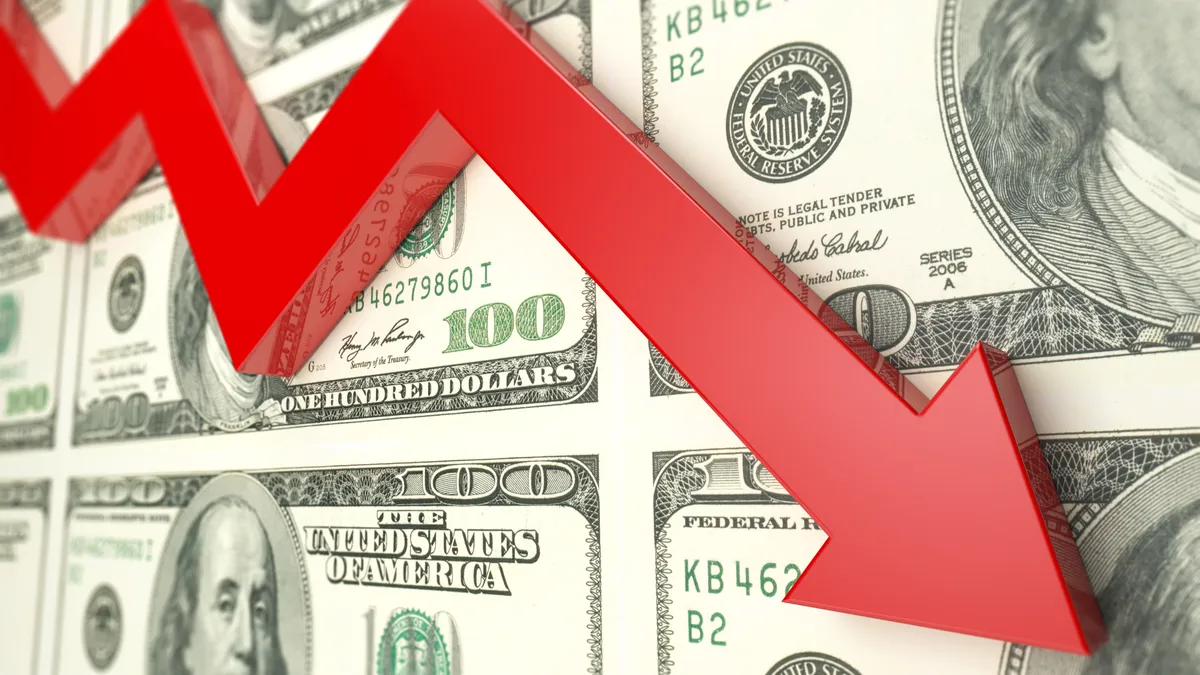Dive Brief:
- An indicator of future economic health fell for the 16th straight month in July, bolstering a prediction of a “short and shallow” recession from the fourth quarter until the first quarter of 2024, the Conference Board said Thursday.
- High interest rates, weak new orders, a dip in consumer perceptions for the business outlook and declining hours worked in manufacturing pushed down the Leading Economic Index by 0.4% last month, the Conference Board said.
- “The leading index continues to suggest that economic activity is likely to decelerate and descend into mild contraction in the months ahead,” Justyna Zabinska-LaMonica, senior manager of business cycle indicators at the Conference Board, said in a statement.
Dive Insight:
The market for U.S. Treasurys has also flagged recession risks for several months, with the yields of short-term bills far exceeding those on long-term bonds in what is known as an inverted yield curve. Many investors see a big gap between the yields on 10-year and 2-year Treasurys as a reliable harbinger of a downturn.
At the same time, robust retail spending, solid consumer confidence, a strong labor market and increasing signs of disinflation have prompted many private and public sector economists, including those at the Federal Reserve, to reverse recession forecasts in recent weeks.
Retail sales rose 0.7% in July, increasing for the fourth consecutive month as shoppers stepped up spending following several weeks of disinflation, solid wage gains and high demand for workers. Sales by e-commerce and other nonstore retailers surged 1.9% during the month and 10.3% compared with July 2022, the Commerce Department said Tuesday.
Some economists expect that the economy, despite the most aggressive monetary tightening in four decades, will achieve a “soft landing,” avoiding widespread layoffs and a recession as inflation falls toward the Fed’s 2% target.
“The economy isn’t landing — it’s flying high,” Ed Yardeni, president of Yardeni Research, said Wednesday in a research note, predicting that inflation will slow further.
Yardeni cited better-than-expected reports for housing starts and industrial production as well as robust consumer spending and residential investment.
The Atlanta Fed on Wednesday forecast that the economy will grow 5.8% on an annual basis during the third quarter, increasing its estimate from 3.9% on Aug. 1.
“As we all know the economy continues to grow,” Home Depot CEO Edward Decker said Tuesday, referring to “another great GDP print for the second quarter.”
“Fears of a recession, or at least a severe recession have largely subsided and the consumer is generally healthy,” Decker said during the company’s quarterly earnings call.
Jobless claims during the week ended Aug. 12 declined by the most in five weeks, the Labor Department said Thursday, signaling that the labor market remains resilient even though the Fed since March 2022 has increased the main interest rate from near zero to a range between 5.25% and 5.5%.
The Conference Board on Thursday acknowledged current signs of economic strength, noting that its Coincident Economic Index has grown “slowly but inconsistently.”
“The CEI is signaling that we are currently still in a favorable growth environment,” Zabinska-LaMonica said. The CEI’s components include industrial production, payroll employment, personal income less transfer payments and manufacturing trade and sales.















